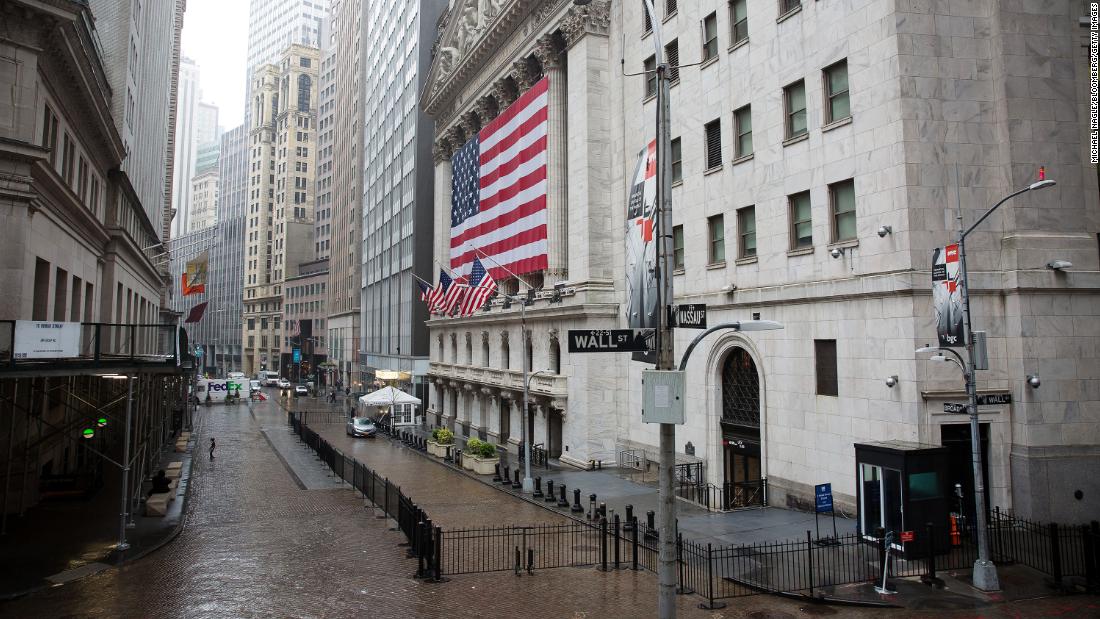
New York (CNN Business)Corporate debt was already at historic highs even before the coronavirus crisis. Now it’s soaring at an unprecedented pace as companies scramble to ensure they have enough cash to weather the crisis.
“If a company is borrowing just to survive through the pandemic, that borrowing could in the future impact their ability to invest in other things,” said Will Caiger-Smith, associate editor of research firm Debtwire. “It’ll be a headwind to the recovery. They won’t just answer to their shareholders or employees, they’ll have to answer to their lenders.”
The value of investment-grade corporate bonds issued in 2020 so far by companies outside the financial sector is $425 billion, according to data from Refinitiv. That’s nearly twice what was issued a year ago at this time. More than $300 billion of that came in March and the first three weeks of April alone — the two biggest months for corporate bond issues on record.
That increase in corporate debt is “very broad based,” said Matt Toole, the deals intelligence director at Refinitiv. “At the point where your industry is shut and [has] no date to come back, [they’re working to] insure that they are keeping adequate levels of cash.”
The amount of non-investment-grade debt, or junk bonds, has not grown as fast, as investors shied away from riskier debt early in the crisis.
“The high-yield market was essentially shut for about three weeks in a row in March,” said Toole. But now that debt is growing again, adding more than $91 billion in that riskier debt to balance sheets.
Companies have also turned to lines of credits they had arranged before the crisis, sometimes years ago. They have drawn down most, or in many cases all, of the cash available to them. More than 50 companies have accessed at least $1 billion from their credit lines in the last two months, according to Refinitiv.
Companies such as those, along with airlines, restaurants, retailers and hotel chains, are trying to make up for the steep plunges in their sales. Exxon Mobil (XOM), hurt by the nosedive in oil demand and prices, has sold $18 billion in bonds.
General Electric (GE) and Disney (DIS), two other companies badly hurt by the virus-inspired shutdowns, each sold nearly $6 billion in bonds.
Healthy companies are adding debt, too
Some companies that are not suffering are also adding debt. Netflix (NFLX), which is growing its revenue and subscriber base as people are locked at home, announced Wednesday that it was adding $1 billion in debt to finance more shows and movies.
“The reason some of them are going to market [with debt offerings], the reason they’re drawing down cash is to be safe,” said Kenneth Emery, senior vice president at credit rating agency Moody’s.
Some of those firms are issuing new debt because rates are extremely low for companies with good credit. The largest debt issue was by Oracle (ORCL), the software company that gets most of its revenue from cloud services and reported improved results before the crisis began. It sold $20 billion in bonds, sying it said it will use those proceeds for “general corporate purposes, which may include stock repurchases, payment of cash dividends on its common stock, repayment of indebtedness and future acquisitions.”
Corporate bonds stood at a record $9.6 trillion heading into 2020, according to the Securities Industry and Financial Markets Association. That’s a 20% increase in just the last five years.
“There was concern about the level of corporate debt even before this,” said Toole.
Last May, Federal Reserve Chairman Jerome Powell gave a prophetic speech in which he warned about the risk posed by the rising amount of corporate debt, especially what would happen in the next economic downturn.
“Business debt has clearly reached a level that should give businesses and investors reason to pause and reflect. If a downturn were to arrive unexpectedly, some firms would face challenges,” he said at the time. “A highly leveraged business sector could amplify any economic downturn as companies are forced to lay off workers and cut back on investments.”
Read more: https://www.cnn.com/2020/04/25/economy/corporate-debt/index.html



Recent Comments